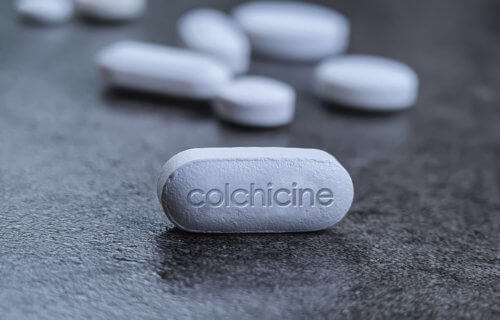SÃO PAULO, Brazil — An inexpensive medication used to treat gout may help seriously ill COVID-19 patients recover faster, doctors say. The drug, colchicine, was shown to shorten hospitalization times for coronavirus patients particularly struggling with respiratory issues.
Colchicine is one of the oldest remedies still in use today. It works by dampening inflammation, one of the “cardinal features” of moderate to severe coronavirus infection, the Brazilian team says. Their study finds the drug reduces the time spent wearing breathing tubes by almost 40 percent, speeding up discharge dramatically for patients.
“Colchicine reduced the length of both, supplemental oxygen therapy and hospitalization,” the authors, who hail from the University of São Paulo, write. “Whatever the mechanism of action, it seems to be beneficial for the treatment of hospitalized patients with COVID-19.”
Coronavirus kills by causing the immune system to “overreact.” This can trigger a so-called “cytokine storm” and lead to organ failure. White blood cells called leucocytes produce the immune cells.
“Systemic inflammation is the hallmark of hospitalized patients due to COVID-19, for which there is no specific treatment but supportive care and attempts to control the immune activation,” the study explains. “By diminishing the activation of leucocytes, colchicine may be an intervention worthy of being tested.”
Colchicine use could help keep hospital beds open for most serious patients
Last month a study by Canadian scientists found a daily dose of the anti-inflammatory pill reduced the risk of vulnerable coronavirus patients being admitted to hospital by 25 percent. The compound is derived from the stem of the autumn crocus plant. Its use as a herbal remedy for joint pain dates back 3,500 years ago, to ancient Egypt. Besides gout, it’s also used to treat the condition Familial Mediterranean Fever.
The latest findings published in British journal RMD Open are based on 72 hospital patients. Their symptoms ranged from fever, breathing difficulties and pneumonia, to rapid breathing rates of 30 or more times a minute and low levels of oxygen. Half were randomly assigned to 0.5 mg colchicine three times a day for five days, and the same dose twice a day for the next five, while the others got a dummy drug.
The average length of time the former group needed oxygen therapy was four days, compared with 6.5 for the latter. Similarly, the average hospital stay was seven and nine days, respectively.
After a week, just one in eleven (9%) of those treated with colchicine needed maintenance oxygen, versus more than four in ten (42%) of the rest.
“Patients receiving colchicine abandoned oxygen supplementation earlier and the time until discharge followed a similar tendency,” the authors write. “These two primary endpoints have relevance for daily practice in the COVID-19 pandemic, by reducing the length of hospitalization, consequently diminishing costs and the need for hospital beds. Besides that, the treatment with colchicine is not expensive.”
Two patients died, both of whom were in the placebo group. Overall, colchicine was safe and well tolerated. There were no serious side effects such as heart or liver damage or immune system suppression that have been linked to other drugs used to treat the infection. All participants received standard medications including antibiotics, the blood thinner heparin, and oxygen boosting steroids and intensive care if required. Most were obese, a known risk factor for death from COVID-19, with only five within a healthy range.
More tests on drug’s effectiveness to come
The study was not able to show if colchicine might avoid the need for intensive care, or lessen the risk of death. But it may lessen the body’s inflammatory response and help ward off damage to endothelial cells that line vessel walls.
“This is the first randomized controlled trial on colchicine for COVID-19,” the study says. “Colchicine may be considered as an adjunctive (supplement) therapy for hospitalized patients with moderate to severe COVID-19.”
In January, the Canadian study of 4,000 COVID-19 patients found colchicine cut the risk of death or the need for mechanical ventilation by 44 and 50 percent, respectively. But too few patients had reached this stage for the findings to be statistically significant.
Colchicine is also among the drugs being tested as part of the RECOVERY trial, run by the University of Oxford. It was the study, the largest of its kind, that found anti-malarial drug hydroxychloroquine touted by Donald Trump was ineffective at fighting the coronavirus.
SWNS writer Mark Waghorn contributed to this report.
